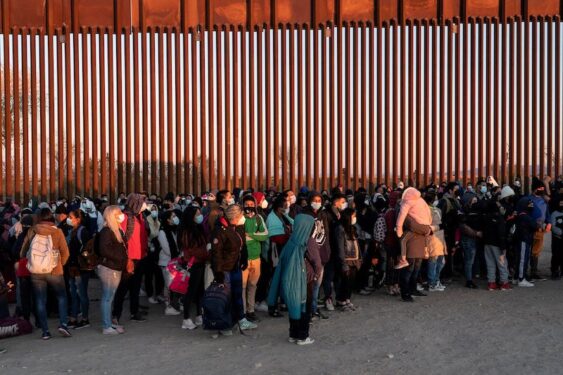
NEW YORK — Sister Tracey Horan is noticing that the reality that migrants no longer have access to the asylum process, which is enshrined in international law, is becoming normalized in the United States.
Sister Tracey recalls that as recently as 2018 migrants could present themselves at a port of entry and make an asylum claim. If their claim wasn’t deemed credible they would be sent back. If it was deemed credible they would start the asylum process. If at the end of the process it wasn’t deemed credible, then too, would they be deported.
[Related: Prayer Can Guide Encounters At the Margins In Work For Justice, Bishop Says]
Reminding people of that fact can go a long way, she said.
“All we need to do is remind ourselves that the problem now is that what is happening has become normalized,” said Sister Tracey, the assistant director of the Kino Border Initiative. “I know it can seem like we’re in a totally different moment, but taking a look at our very recent history of how that worked and reminding ourselves that at one time we had the capacity to do this and it was something that was happening on a daily basis at all of our ports of entry.”
Sister Tracey spoke at a 2022 Catholic Social Ministry Gathering discussion on listening at the border.
As she mentioned, the moment was different in 2018. Fiscal Year 2019 — from Oct. 1, 2018, to Sept. 30, 2019 — was the last full fiscal year with the asylum process intact. That year, there were about 988,000 U.S. Customs and Border Protection southwest land border encounters. In Fiscal Year 2021, which ended Sept. 30, there were about 1,735,000 southwest land border encounters, despite the use of deterrent policies that limit the legal right to asylum.
“What’s happening now is that the U.S. government is telling those who arrive at the port to seek protection that they have no options, that they have to wait and there is no asylum,” Sister Tracey said. “Those people are forced into uncertainty for months, or sometimes years.”
The effect of the COVID-19 pandemic on Central American countries was a driver of migration in the last fiscal year that has continued into the early part of Fiscal Year 2022. The pandemic has exacerbated economic instability, which in turn has led to an increase in crime and violence. Government corruption, climate change, and a perception that the Biden administration has looser border policies have also been factors.
Supporters of the policies argue they’re a necessary step to curb the influx of migrants at the border. Though, the numbers suggest they’ve had a negligible impact.
Cardinal Álvaro Ramazzini Imeri of Huehuetenango, Guatemala, has witnessed for decades the hardship Guatemalans endure that forces them to make the journey to the United States. Cardinal Ramazzini said there’s a responsibility from all people, not just Catholics, to “recognize and defend the invaluable dignity of those who flee real danger in search of a ceiling and security.”
“Welcoming and finding legal pathways for entry and no longer pushing migrants and displaced people to a country where they face persecution and violence,” Cardinal Ramazzini said.
He also decried an economic system in Guatemala in which the “poor become poorer and the rich, richer,” and said that the United States has a role to play in creating a better distribution of the wealth in the country by applying pressure to businessmen.
“I consider that North American businessmen who maintain economic relations with Guatemala’s rich businessmen, if they are Catholic, could apply moral pressure to influence ethical behaviors in Guatemalan businessmen, and the United States government could continue this fight against corruption and injustice,” Cardinal Ramazzini said.
There haven’t been any signs that the influx of migrants at the U.S.-Mexico border has slowed down. The number of southwest land border encounters reported by CBP were about 175,000 and 179,000 in November and December, respectively.
In December, the U.S.-Mexico border in Arizona became a hotspot for crossings, which is where Sister Tracey and the Kino Border Initiative work. They work with migrants on both sides of the border in Nogales, Arizona, and Nogales, Sonora, in Mexico.
Sister Tracey said the “complex realities” of the migrants she works with at the border, including people who can’t put food on the table for their children, people who are fleeing, and people seeking something in the U.S. like family members or work.
Sister Tracey noted that her work is anchored on building relationships with the migrants, and she believes that’s the first step to providing service and creating structural changes.
“I think churches and people of faith have a really important role of being intentional about building relationships, creating ministries where people are interacting across cultural lines, across language barriers, and getting to know each other,” she said. “I think that’s where a lot of change can take place.”
Father David Couturier, the executive director of the Franciscan Institute at St. Bonaventure University, made the case that people need to advocate for consistent policies on immigration and economics that don’t change on migrants every election cycle.
“Let’s have consistent policy that is developed as a legislative compromise not subject to radical change every time a president comes in,” Father Couturier said. “We can’t leave immigrants to that kind of instability and volatility. Let’s have policy initiatives that are equitable, transparent, and that are consistently enforced.”
